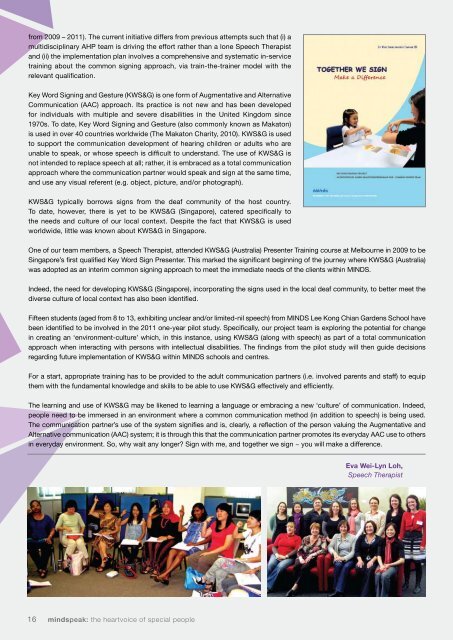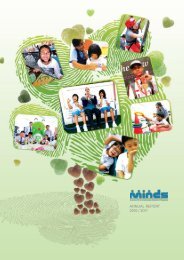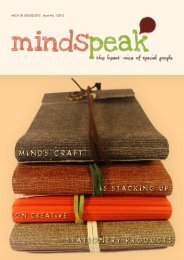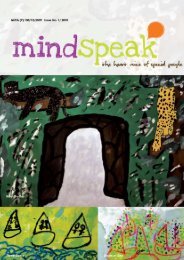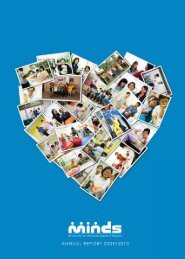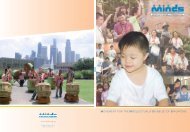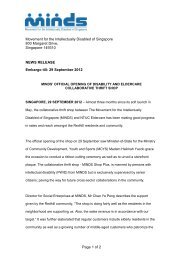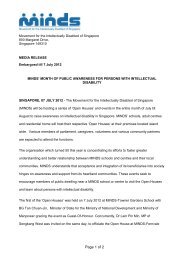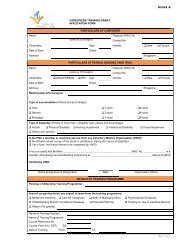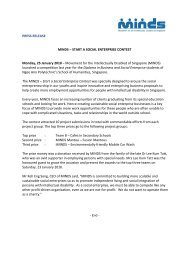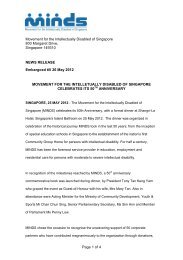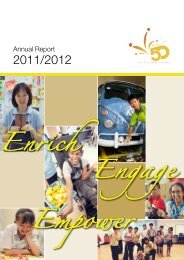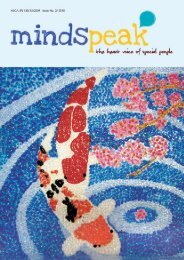MICA (P) 129/02/2011 Issue No. 2/2011 - MINDS
MICA (P) 129/02/2011 Issue No. 2/2011 - MINDS
MICA (P) 129/02/2011 Issue No. 2/2011 - MINDS
You also want an ePaper? Increase the reach of your titles
YUMPU automatically turns print PDFs into web optimized ePapers that Google loves.
from 2009 – <strong>2011</strong>). The current initiative differs from previous attempts such that (i) a<br />
multidisciplinary AHP team is driving the effort rather than a lone Speech Therapist<br />
and (ii) the implementation plan involves a comprehensive and systematic in-service<br />
training about the common signing approach, via train-the-trainer model with the<br />
relevant qualification.<br />
Key Word Signing and Gesture (KWS&G) is one form of Augmentative and Alternative<br />
Communication (AAC) approach. Its practice is not new and has been developed<br />
for individuals with multiple and severe disabilities in the United Kingdom since<br />
1970s. To date, Key Word Signing and Gesture (also commonly known as Makaton)<br />
is used in over 40 countries worldwide (The Makaton Charity, 2010). KWS&G is used<br />
to support the communication development of hearing children or adults who are<br />
unable to speak, or whose speech is difficult to understand. The use of KWS&G is<br />
not intended to replace speech at all; rather, it is embraced as a total communication<br />
approach where the communication partner would speak and sign at the same time,<br />
and use any visual referent (e.g. object, picture, and/or photograph).<br />
KWS&G typically borrows signs from the deaf community of the host country.<br />
To date, however, there is yet to be KWS&G (Singapore), catered specifically to<br />
the needs and culture of our local context. Despite the fact that KWS&G is used<br />
worldwide, little was known about KWS&G in Singapore.<br />
One of our team members, a Speech Therapist, attended KWS&G (Australia) Presenter Training course at Melbourne in 2009 to be<br />
Singapore’s first qualified Key Word Sign Presenter. This marked the significant beginning of the journey where KWS&G (Australia)<br />
was adopted as an interim common signing approach to meet the immediate needs of the clients within <strong>MINDS</strong>.<br />
Indeed, the need for developing KWS&G (Singapore), incorporating the signs used in the local deaf community, to better meet the<br />
diverse culture of local context has also been identified.<br />
Fifteen students (aged from 8 to 13, exhibiting unclear and/or limited-nil speech) from <strong>MINDS</strong> Lee Kong Chian Gardens School have<br />
been identified to be involved in the <strong>2011</strong> one-year pilot study. Specifically, our project team is exploring the potential for change<br />
in creating an ‘environment-culture’ which, in this instance, using KWS&G (along with speech) as part of a total communication<br />
approach when interacting with persons with intellectual disabilities. The findings from the pilot study will then guide decisions<br />
regarding future implementation of KWS&G within <strong>MINDS</strong> schools and centres.<br />
For a start, appropriate training has to be provided to the adult communication partners (i.e. involved parents and staff) to equip<br />
them with the fundamental knowledge and skills to be able to use KWS&G effectively and efficiently.<br />
The learning and use of KWS&G may be likened to learning a language or embracing a new ‘culture’ of communication. Indeed,<br />
people need to be immersed in an environment where a common communication method (in addition to speech) is being used.<br />
The communication partner’s use of the system signifies and is, clearly, a reflection of the person valuing the Augmentative and<br />
Alternative communication (AAC) system; it is through this that the communication partner promotes its everyday AAC use to others<br />
in everyday environment. So, why wait any longer? Sign with me, and together we sign ~ you will make a difference.<br />
Eva Wei-Lyn Loh,<br />
Speech Therapist<br />
16 mindspeak: the heartvoice of special people


